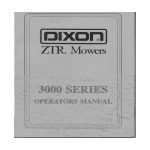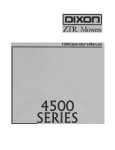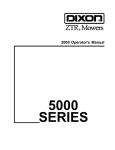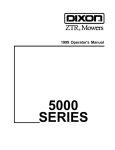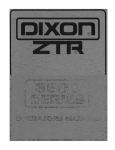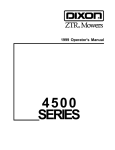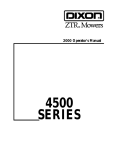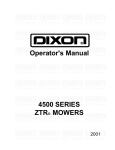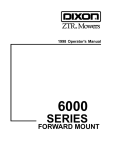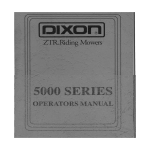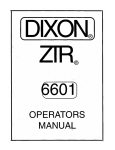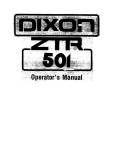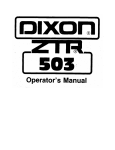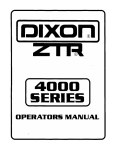Download Dixon ZTR 5020 Operator`s manual
Transcript
IMPORTANT: READ CAREFULLY The Dixon® ZTR® Mower is both easy and fun to operate. However, any power mower must be operated properly to be safe. It is not a toy or a recreational vehicle. Before you start to use the mower: read the operator's manual carefully, and become completely familiar with the controls. The information in this operator's manual applies to all Dixon® ZTR® Series Mowers. Your Dixon dealer will gladly provide a check-out ride, and answer any questions. See your dealer for warranty service, parts and repairs. DIXON INDUSTRIES, INC. A BLOUNT International Inc. Co. PO BOX 1569 COFFEYVILLE KS 67337 0945 3162512000 INDEX SAFETY..............................................................Pages 1 - 6 WARRANTY POLICY .........................................Page 7 SPECIFICATIONS ..............................................Page 8- 9 SEAT ADJUSTMENT..........................................Page 10 CONTROLS........................................................Pages 11 -14 OPERATION INSTRUCTIONS............................Pages 15-22 CARE AND MAINTENANCE ...............................Pages 23-37 STANDARD SERVICE PARTS LIST ...................Page 38 - 39 TROUBLESHOOTING ........................................Pages 40 - 43 Part No. 5749 January 1998 mn1/98 MY98 RIDING LAWNMOWERS, IF IMPROPERLY OPERATED, CAN CAUSE SERIOUS INJURY OR DEATH The most common causes of injury to the operator or bystander.. Page 2 read and understand this manual to prevent injuries. SAFETY SYMBOLS: SAFETY ALERT SYMBOL When you see this symbol, BE ALERT to the potential for injury. Follow recommended safety precautions and safe operating practices. Danger indicates an imminently hazardous situation which, if not avoided, will result in death or serious injury. Warning indicates a potentially hazardous situation which, if not avoided, could result in death or serious injury. Caution indicates a potentially hazardous situation which, if not avoided, may result in minor or moderate injury. It may also be used to alert against unsafe practices. Page 3 This cutting mower is capable of amputating hands and feet, and throwing objects. Failure to observe the following safety instructions could result in serious injury or death. GENERAL OPERATION: • Read, understand, and follow all instructions in the manual and on the mower before starting. • Only allow responsible adults, who are familiar with the instructions, to operate the mower. • Clear the area of objects such as rocks, toys, wire, etc., which could be picked up and thrown by the blade. • Be sure the area is clear of other people before mowing. Stop mower if anyone enters the area. • Never carry passengers. • Do not mow in reverse unless absolutely necessary. Always look down and behind before and while backing. • Be aware of the mower discharge direction and do not point it at anyone. Do not operate the mower without either the entire grass catcher or the deflector in place. • Slow down before turning. • Never leave a running mower unattended. Always turn off blades, set parking brake, stop engine, and remove key before dismounting. • Turn off blades when not mowing. • Stop engine before removing grass catcher or unclogging chute. • Mow only in daylight or good artificial light. • Do not operate the mower while under the influence of alcohol or drugs. • Watch for traffic when operating near or crossing roadways. • Use extra care when loading or unloading the mower into a trailer or truck. Do not ride the mower when loading & unloading. The Engine Exhaust from this product contains chemicals known to the State of California to cause cancer, birth defects or other reproductive harm. Page 4 SLOPE OPERATION: Slopes are a major factor related to loss-of-control and tip-over accidents, which can result in severe injury or death. All slopes require extra caution. If you cannot back up the slope or if you feel uneasy on it, do not mow it. DO Mow across the slope with your Dixon ZTR - never up or down. Remove obstacles such as rocks, tree limbs, etc. Watch for holes, ruts or bumps. Uneven terrain could overturn the mower. Tall grass can hide obstacles. Use slow speed. Use extra care with grass catchers or other attachments. These can change the stability of the mower. Keep all movement on the slopes slow and gradual. Do not make sudden changes in speed or direction. Avoid starting or stopping on a slope. If tires lose traction, disengage the blades and proceed slowly down the slope. DO NOT Do not turn on slopes unless necessary, and then, turn slowly and gradually downhill, if possible. Do not mow near drop-offs, ditches, or embankments. The mower could suddenly turn over if a wheel is over the edge of a cliff or ditch, or if an edge caves in. Do not mow on wet grass. Reduced traction could cause sliding. Do not try to stabilize the mower by putting your foot on the ground. Do not use grass catcher on steep slopes. Page 5 CHILDREN: Tragic accidents can occur if the operator is not alert to the presence of children. Children are attracted to lawn mowers and the mowing activity. NEVER assume children will stay where they were last seen. — Be alert to avoid accidents. • Keep children out of the mowing area and under the watchful care of another responsible adult. • Be alert and turn mower off if a child enters the area. • Before and during backing, look behind and DOWN for small children. • Never carry children. They may fall off and be seriously injured or interfere with safe mower operation. • Never allow children to operate the mower. • Use extra care when approaching blind corners, shrubs, trees, or other objects that may obscure vision. Page 6 SERVICE: • DRINK/CUP HOLDER located on left rear fender is for transporting or carrying ONLY! Mower usage requires that both hands be free to control individual levers. DO NOT attempt operation of mower with any type of container or other object in either hand. • Use extra care in handling gasoline and other fuels. They are flammable and vapors are explosive. Use only an approved container. Never remove gas cap or add fuel with the engine running. Allow engine to cool before refueling. Do not smoke. Never refuel the mower indoors. Never store the mower or fuel container inside a building where there is an open flame. • Never run a mower inside a closed area. • Keep nuts and bolts, especially blade attachment bolts, tight and keep equipment in good condition. • Never tamper with safety devices. Check their proper operation regularly. • Keep mower free of grass, leaves, or other debris buildup. Clean up oil or fuel spillage. Allow mower to cool before storing. • Stop and inspect the equipment if you strike an object. Repair, if necessary, before restarting. • Never make adjustments or repairs with the engine running. • Grass catcher components are subject to wear, damage, and deterioration, which could expose moving parts or allow objects to be thrown. Frequently check components and replace with original equipment parts, when necessary. • Mower blades are sharp and can cut. Wrap the blade(s) or wear gloves, and use extra caution when servicing them. • Batteries contain sulfuric acid. To prevent burns avoid contact with skin, eyes and clothing. To prevent a fire or explosion keep sparks and open flames away from battery. Before disconnecting the negative (-) ground cable, make sure all switches are OFF. • Check to assure that the drive chains are properly adjusted. A loose chain may come off causing loss of control. This statement applies to chain drive models 2301, 3000 & 4000 Series. . . . . . . . Page 7 DIXON LIMITED WARRANTY POLICY -- ESTATE MODELS This warranty policy applies to all Estate Mowers purchased on or after September 1, 1997. WARRANTY: Commercial Applications: Dixon Estate Models used in any commercial application are warranted for a period of six (6) months from date of purchase. Commercial applications or use is defined as any use other than at owners primary place of residence. Home Owner Applications: Dixon Estate Models used primarily at the owner's place of residence are warranted for a period of two (2) years from date of purchase. DIXON ZTR MOWERS ARE WARRANTED AGAINST DEFECTS IN MATERIALS AND WORKMANSHIP AND PROVIDES FOR REPLACEMENT OR REPAIR OF PARTS INCLUDING LABOR COSTS. THIS WARRANTY IS SUBJECT TO THE FOLLOWING CONDITIONS AND LIMITATIONS: 1 . Warranty applies only to original retail purchaser of new and unused mowers and accessories. 2. All Dixon warranty must be accomplished by authorized Dixon dealers and in accordance with Dixon warranty policy and allowances. All warranty claims must be approved by Dixon Industries, Inc. 3. Battery warranty: Limited to 90 days from date of purchase. 4. Accessories Warranty (Grass Catchers, Snow Blades, Tine Rakes, Covers, etc.): Limited to 90 days from date of purchase. 5. Warranty does not apply to damage in transit or incidents of misuse, negligence, accidents, or alteration. The use of parts or components other than those supplied by Dixon Industries, Inc. VOIDS ALL WARRANTY. 6. The following items are not covered by this warranty policy: (a) Pick up and delivery charges for transportation of mower to and from an Authorized Dixon Dealer's place of business, (b) Routine maintenance or adjustments, (c) Belts / cutting blades / HydroGear Filters, (d) Engines - All engines used on Dixon ZTR mowers are warranted by each individual engine manufacturer, (e) Any costs or expense of providing substitute equipment while repair work is being performed on a warranted mower. 7. There is no other express warranty. Implied warranties, including those of merchantability and fitness for a particular purpose, are limited to the same duration of the express warranty, and to the extent permitted by law any and all implied warranties are excluded. Liabilities for consequential damages under any and all warranties are excluded. WARRANTY VALIDATION: At the time of sale, selling dealer must review each portion of this warranty document, complete the information section below, secure customer's signature and send copy to Dixon Industries, Inc. DATE OF PURCHASE Mod el S/N (Owner's Name) (Dealership) (Address) (Address) (Dealer's Signature) (Owner's Signature) SEE DEALER FOR DETAILS Page 8 DM- SPECIFICATIONS Model ZTR 5424 CHASSIS: 11 GA - rectangular tube BODY: Two piece - made of rotational molded polyethylene. Front body contains access panels for battery service and engine to mower deck belt removal. Rear body tilts up to allow service on the entire drive system. SEAT: Designed for operator comfort by use of high density closed cell foam padded back and arm rests, upholstered with Cordura™ water-repellent fabric. Seat is adjustable fore and aft. MOWER DECK: 1 3 GA stamped steel construction 3 blades combine for a 42" cut width Cut height approximately 1 .5" to 4.5" via 7 position lift handle BLADE DRIVE: Electric clutch DRIVE SYSTEM: Each rear wheel is independently driven by a HydroGear BDU-10L Series 70 hydrostatic transmission. The hydrostatic transmissions, in turn, power a fully enclosed HydroGear gearbox. ENGINE: 17HP Briggs & Stratton Intek, overhead valves, replaceable oil filter, dual element air cleaner, impulse fuel pump STARTING SYSTEM: Electric by key switch operation with safety interlocks on parking brake and blade drive clutch. TIRES: Front Rear RECOMMENDED TIRE PRESSURE: Front , CAPACITIES: \ DIMENSIONS: Width Height Length Weight NOTE: Additional information provided in service instructions underthe individual component. 11 X 4 X 5 smooth profile 18 X 9.5 X 8 Multi Trac CS 16-21 Ibs. Rear 8- 14 Ibs. ' Fuel - 4.8 gallons total (dual tanks) Hydrostat oil tank - 3 quart with in-line 10 micron filter Hydrostat oil recommendation, refer to page 37 Engine - 2 qts. SAE 30 (with filter) 54" 45" 72" 61 5 Ibs. SPECIFICATIONS SUBJECT TO CHANGE WITHOUT NOTICE Page 9 SPECIFICATIONS Model ZTR 5020 CHASSIS: BODY: 11 GA - rectangular tube Two piece - made of rotational molded polyethylene. Front body contains access panels for battery service and engine to mower deck belt removal. Rear body tilts up to allow service on the entire drive system. SEAT: Designed for operator comfort by use of high density closed cell foam padded back rest and arm rests, upholstered with Cordura™ water-repellent fabric. Seat is adjustable fore and aft. MOWER DECK: 3 Decks are available. 42" & 60" are made of stamped steel. 50" is made of 1 1 GA fabricated welded construction with external reinforcement ribs 3 blades combine for either a 42", 50", or 60" cut width Cut height approximately 1 .5" to 4.5" via 8 position lift handle BLADE DRIVE: Electric clutch DRIVE SYSTEM: Each rear wheel is independently driven by a HydroGear BDU-10L Series 70 hydrostatic transmission. The hydrostatic transmissions, in turn, power a fully enclosed HydroGear gearbox. ENGINE: 20HP Briggs & Stratton Intek, overhead valves, replaceable oil filter, full pressure lube system, dual element air cleaner, integral fuel pump. STARTING SYSTEM: Electric by key switch operation with safety interlocks on parking brake and blade drive clutch. TIRES: Front Rear RECOMMENDED TIRE PRESSURE: Front Rear CAPACITIES: Fuel - 4.8 gallons total (dual tanks) Hydrostat oil tank - 3 quart with in-line 10 micron filter Hydrostat oil recommendation, refer to page 37 Engine - 2 qts. SAE 30 (with filter) 11 X 4 X 5 smooth profile 20 X 1 0.5 X 8 Multi Trac 16-21 Ibs. 8- 14 Ibs. , DIMENSIONS: Width Height Length Weight 54"(42" Deck), 60"(50" Deck), 73"(60"Deck) 45" 72" 630 lbs.(42" Deck), 668 Ibs. (50" Deck), 685 Ibs. (60" Deck) NOTE: Additional information provided in service instructions under the individual component. SPECIFICATIONS SUBJECT TO CHANGE WITHOUT NOTICE Page 10 SEAT ADJUSTMENT INSTRUCTIONS Models ZTR 5424 - ZTR 5020: 1. Place parking brake in ON position. (Pull brake lever up) 2. Raise and push seat assembly and upper body rearward. 3. Loosen two front seat adjustment knobs, P/N 3978, and slide seat forward or backward to desired position. 4. Re-tighten front seat adjustment knobs, P/N 3978. DO NOT operate mower without seat adjustments properly tightened. 5. Carefully lower upper body and seat assembly to the closed position. Page 11 Page 12 CONTROLS PARKING BRAKE: The parking brake used on the Estate Series Models is designed to hold the mower from moving and is not intended for use in stopping the mower while it is in motion. Engage parking brake before starting engine. Do not leave engine running for extended periods of time without the parking brake engaged. Damage to the drive system could result. TO SET PARKING BRAKE: The hand operated parking brake is located at left hand side of mower. To engage brake, pull lever up and to the rear. To release brake, move lever forward and down. NOTE: Always set parking brake before dismounting. Release parking brake before moving mower. HYDRO-GEAR DRIVE SYSTEM: Allows the mower to turn on its own axis (zero turning radius). Drive levers control braking, turning, travel speed and direction. Each lever controls one side of the mower. NOTE: The pressure required to operate the mower is very light. A minimum of 1/2 hour should be spent simply driving the mower without the blade drive engaged. Page 13 CONTROLS TO GO FORWARD: From neutral position, gently push both drive levers forward. To increase speed, move levers farther forward. TO GO BACKWARD: From neutral position, gently pull both drive levers toward you. TURNING: Turning is controlled by moving one drive lever slightly forward or rearward of the other. To turn left, move left lever rearward of the right lever. To turn "square corners" move lever of desired direction to neutral. To turn on mower's own axis (zero turning radius) stop and move one lever to reverse position and the other to forward position. BRAKING: To brake mower, move both levers in direction opposite of travel, release levers to neutral, set parking brake. Park only on level surfaces. CHOKE CONTROL LEVER: Located on control panel to operator's right. Used to start a cold engine. THROTTLE CONTROL LEVER: Located on control panel to operator's right. Controls engine speed, slow to maximum. While mowing, throttle control should be set to the MAXIMUM or wide open setting to insure adequate cooling of the engine and to maintain mower deck blade speed. Page 14 CONTROLS BLADE DRIVE: Located on control panel, on operator's right. To engage the mower blades, lift switch up lightly and push forward. : To disengage blades, pull switch backward. Switch is clearly marked "on and off". CIRCUIT BREAKER: Located on control panel, on operator's right. Protection of the electrical system is by (1)15 amp circuit breaker. If circuit breaker trips, push button to reset. If this condition repeats, consult dealer for inspection and repair. MOWER DECK CUT HEIGHT LIFT LEVER: Located to the right and front of operator. Controls the cutting height. Seven positions of adjustment, Model ZTR 5424. Eight positions of adjustment, Model ZTR 5020. Move lever in and forward to lower. Move lever in and back to raise. NOTE: Always use high position for transport. Page 15 OPERATION INSTRUCTIONS The safe and successful operation of the Estate Series Models will depend upon the operator having the correct knowledge of all controls used on the mower and making good judgements about the terrain to be mowed. NEVER allow anyone to operate the mower without complete knowledge of all controls and their functions. During initial operation, "learning to drive", set throttle at slow speed. Sound judgement by the owner will prevent accidents. • DRINK/CUP HOLDER located on left rear fender is for transport or carrying ONLY! Mower usage requires that both hands be free to control individual levers. DO NOT ATTEMPT operation of mower with any type of container or other object in either hand. BEFORE OPERATING MOWER: 1. Read engine manufacturer's operating and maintenance instructions. 2. Discuss proper maintenance with your dealer. 3. Read and observe all safety instructions on your mower and in the manual. 4. Check engine oil. 5. Check gas cap to be sure it is in place. 6. Be sure parking brake is on. 7. Mower blade drive is off. 8. Know how to stop engine. (Turn key to off position) Page 16 OPERATION INSTRUCTIONS TESTING OF SAFETY INTERLOCK SYSTEMS: PARKING BRAKE SWITCH TEST: With parking brake in the OFF position, engine should not turn over or attempt to start when the key switch is moved to the start position. BLADE DRIVE SWITCH TEST: a. With electric blade drive switch turned ON and parking brake in the ON position, engine should not turn over or attempt to start when key switch is moved to the start position. b. In a SAFE AREA away from bystanders, start the engine, place throttle setting at maximum or full. Engage the blades by turning the blade drive switch to the ON position. Raise weight slightly off of seat. Engine should stop. c. If any Safety Check fails, do not operate the mower until the system has been checked and repaired by an Authorized Dixon ZTR Dealer. Page 17 OPERATION INSTRUCTIONS STARTING INSTRUCTIONS: Cold Engine 1. Push choke control lever fully forward. 2. Push throttle control lever to 1/2 setting. 3. Insert ignition key and turn to "Start" position. When engine starts, release ignition key. Key will return to "Run" position. 4. Once engine starts to warm up, slowly move choke control lever to the fully closed position. 5. Move throttle control lever to the wide open or maximum setting for actual operation of the mower deck. 6. Engine must be operated at wide open or maximum setting to insure adequate lubrication, cooling and cut quality of the mower deck. Page 18 OPERATION INSTRUCTIONS STARTING INSTRUCTIONS: Engine has been operated. 1. Move throttle control lever to 1/4 to 1/2 setting. 2. Insert ignition key and turn to "Start" position. When engine starts, release ignition key. Key will return to "Run" position. 3. Move throttle control lever to wide open or maximum setting for actual operation of the mower deck. 4. Engine must be operated at wide open or maximum setting to insure adequate lubrication, cooling and cut quality of the mower deck. DO NOT operate the engine in an enclosed area due to the harmful exhaust gas produced. NOTE: On initial operation, set throttle at slow speed. Engine cannot be restarted when blade is engaged. Safety switches stop engine when operator leaves seat while mower blade is engaged. Always turn engine off when leaving mower. Page 19 OPERATION INSTRUCTIONS MOWING WITH A MULCHING ATTACHMENT: Mulching or recycling the grass clippings requires a totally different mowing approach than would be normal when side discharging or bagging the grass. There may be instances or conditions where it is not possible to hide all of the recycled or mulched clippings. In order to achieve the best results, please read and follow the mulching tips listed below: 1. Set the engine speed control to the wide open or full setting. 2. Place the mower deck cut height selector in either the top or second notch. Never cut more than 3/4" to 1" off the grass at any one time. Attempting to cut more grass will result in the deck plugging and cause the engine to stall. 3. It may be necessary to cut the lawn twice to achieve acceptable mulching performance especially on first cuttings or if the lawn is heavily fertilized. 4. Do Not Attempt To Cut Grass When It Is Wet. Mulching performance will be very poor under wet grass conditions. 5. Maintain A Sharp Blade Throughout The Cutting Season. This is very important. Optimal mulching performance cannot be obtained with a dull or nicked blade. 6. Keep The Underside Of The Mower Deck Clean. Remove all grass and dirt buildup from the underside of the pan, the baffles and deflectors after each use. 7. Alternate mower direction. This will evenly disperse the mulched grass clippings over the lawn for even fertilization. If the mulching quality of the mower does not seem to be satisfactory, try one or more of the following tips: Page 20 1. Raise the height-of-cut setting on your mower. 2. It may be necessary to cut your grass more frequently. 3. Operate the mower at a slower ground speed. 4. Overlap cutting swaths instead of cutting a full swath with each pass. 5. Mow across the marginal areas a second time. 6. CUT HIGH - MOW OFTEN! OPERATION INSTRUCTIONS MOWING WITH A GRASS CATCHER ATTACHMENT: In order to achieve optimum performance when mowing with a grass catching attachment, please read and follow the tips listed below. 1. Set engine speed control to the wide open or full setting. 2. Do Not Attempt To Cut Grass When It Is Wet. Wet grass will clog both the underside of the deck and the attachment chutes. Empty bags often to prevent plugging. 3. If the grass is tall, place the mower deck cut height selector in the top or second notch. "Initially" overlap cutting swaths instead of a full swath with each pass. 4. Keep The Underside Of The Mower Deck Clean. Frequent removal of dried grass and dirt will greatly assist in bagging of the clippings. 5. Use only the correct blade(s). Some grass catching attachments require a "high-lift" blade. See your dealer for advice on the type of blade(s) needed for your mower. 6. Maintain Sharp Blade(s) Throughout The Cutting Season. 7. Operate the mower at a slower ground speed than when mowing without a grass catching attachment. • Watch for low hanging branches or other obstacles which might hit the catcher top while turning or backing the mower. • Use care when backing to avoid pushing the grass bags into the frame or "hot" exhaust muffler of the engine. • Disengage blade and stop engine prior to clearing grass from either the discharge chute or grass catcher components. • Keep all attachment bolts tight. • Do Not operate the mower with the grass catching attachment partially removed. • Important: • Do not leave clippings in the bags while the mower is stored. • Damp grass clippings are a fire hazard if left in the bags. Page 21 OPERATION INSTRUCTIONS SIDE DISCHARGE OF THE CLIPPINGS: In order to achieve optimum performance when side discharging the grass clippings, please read and follow the tips listed below. Additional information can be found in the troubleshooting guide on page 40. Be sure that deflector is properly installed on the discharge chute. 1. Set engine speed control to the wide open or full setting. 2. Do Not Attempt To Cut Grass When It Is Wet. Wet grass will clog the underside of the deck and discharge area. 3. If the grass is tall, place the mower deck cut height lever in the top or second notch. "Initially" overlap cutting swaths instead of a full swath with each pass. Some applications may require a second cutting. 4. Keep The Underside Of The Mower Deck Clean. Frequent removal of dried grass and dirt will allow the clippings to discharge correctly. 5. Maintain Sharp Blade(s) Throughout The Cutting Season. GRASS HEIGHT SUGGESTIONS: Correct mowing height can reduce weeds and disease by 50% to 80% The following grass cut heights are based on adequate moisture conditions and normal thatch buildup in a healthy lawn. Some locations and applications may require slightly different cut heights. If in doubt, consult your local lawn professional for assistance. Grass Types: Zoysia Blue Grass Fescue Blends St. Augustine (Mid South) St. Augustine (Deep South) Tifton Bermuda Centipede Common Bermuda Bahia/Argentina/Pensacola Page 22 Best Cut Heights: - 2" - 2 1/2" 1 1/2" - 3" 1 1/2" - 3" 1 1/2" - 2" 3" - 4" 1 1/2" 1 1/2" - 2" 1 1/2" - 2" 2" OPERATION INSTRUCTIONS DECKROLLERS: Purpose: The spring loaded deck rollers located at the front corners of the mower deck are designed as an aid to limit turf scalping when mowing on uneven ground. Height: Normal height settings as installed at the factory allows each roller to ride slightly above the turf. This setting should prove ideal under most mowing conditions. Adjustment: Some mowing applicatio ns may require lowering of each front roller. To lower the roller, remove the pin, spring, washer and spacer P/N 9789 from the top of roller bracket tube. Remove roller from tube. Slide spacer P/N 9789 on roller shaft and reassemble using washer, spring an d pin at the top. Lubrication: The use of a penetrating oil or light grease on the roller shafts will keep roller moving freely. Page 23 CARE AND MAINTENANCE This portion of the Estate Series Models owners manual deals with normal service items which can be performed by the owner. Please remember that if you are in doubt as to the correct service procedures to be followed, these and other service situations can be handled by a Dixon ZTR dealer who is familiar with the service of your mower. MAINTENANCE SCHEDULE: To insure a long and trouble free service life on all the components used on the Estate Series Models, a regular and thorough maintenance schedule should be followed. The following items should be checked after the first (10) hours of operation and on a weekly basis, or each (40) hours of use: (Items marked with an asterisk * require more frequent attention) 1. 2. 3. 4. 5. 6. 7. 8. Drive system, belts and controls. Mower deck belts. Tire pressures. HydroGear oil tank. Tightness of all nuts and bolts. Battery fluid level. * Engine oil. (Before each use or every 8 hours) Electric blade clutch air gap setting. Before performing any maintenance, shut off engine, allow to cool. ENGINE: For engine operating and maintenance information, refer to the engine operating and maintenance instructions furnished by the engine manufacturer, supplied with each mower. BATTERY: Check the fluid in the battery at frequent intervals. Keep fluid level above the plates in each cell, using distilled water. OFF-SEASON BATTERY STORAGE: Identify each cable so cables can be reconnected to correct terminals. Disconnect cables from terminals. ALWAYS disconnect ground cable first and reconnect last. Charge battery. DO NOT remove battery from mower. Clean top of battery and terminals with baking soda and water. Page 24 CARE AND MAINTENANCE CUTTER BLADE MAINTENANCE: NOTE: Observe proper blade position prior to removal. 1. Safely raise front of mower. 2. Hold or block blade from turning. 3. Loosen blade nut and remove blade. Wear heavy, thick gloves when holding onto cutter blade, avoid the sharp edge of the blade. 4. Tighten blade nut securely. Refer to diagram. NOTE: Be sure blade is centered on pilot before tightening bolt to 60 ft. Ibs. torque. Page 25 CARE AND MAINTENANCE BELT TENSION ENGINE TO MOWER DECK BELT: Model ZTR 5424 Model ZTR 5020 42" 50" 60" P/N 6111 P/N P/N P/N 6111 6111 6938 The engine to mower deck drive belts are automatically held in proper tension by springs which push the deck assembly forward and do not require any additional adjustment to be made. MOWER DECK SERPENTINE BELT: Model ZTR 5424 Model ZTR 5020 42" 50" 60" P/N 6109 P/N P/N P/N 6109 1300 6939 Refer to illustration for adjustment procedure. NOTE: Belt deflection or movement should be approximately 1/4" when measured at mid-point between pulleys. Periodically inspect both belt and idler systems. Page 26 CARE AND MAINTENANCE FUEL SHUT OFF VALVE: A fuel shut off valve is located at the bottom rear of each fuel tank. Always turn the valve to the "OFF" position when the mower is stored or not in use. LUBRICATION CHASSIS: Number of grease zerks used: (7) LOCATIONS: (1 ) each front wheel caster and each front wheel hub (1 ) each mower deck shaft SERVICE INTERVALS: Every 50 hours of operation RECOMMENDED GREASE: Name brand wheel bearing or multi-purpose grease fi Rotate or spin each front wheel after 3 full pumps of the grease gun. Repeat until the appearance of grease is noted around each caster. Lubrication of the mower deck shafts will help dispel moisture within the hub casting. Bearings are of a sealed design. Page 27 CARE AND MAINTENANCE SERIES REAR WHEELS: The rear wheels of all Estate Series models are of an "offset" center design to allow "reversed" installation for using snow chains or to gain increased stability when mowing on sloped ground. Slopes are a major factor related to loss-of-control and tip-over accidents, which can result in severe injury or death. All slopes require extra caution. If you cannot back up the slope or if you feel uneasy on it, do not mow it. WHEEL REVERSAL: * Installation instructions marked with an * asterisk are particularly important. 1. Raise rear of mower and place suitable supports at the rear of the chassis. 2. Remove rear wheel lug nuts and rear wheels. 3. Reinstall rear wheels with valve stems inward. 4.* Install lug nuts with "flat" side of nut against wheel. 5.* Tighten lug nuts to a minimum torque factor of 50 ft. Ibs. Page 28 CARE AND MAINTENANCE CHANGING THE ENGINE OIL: 1. The "snap lock" oil drain valve is located on the left side of the engine crankcase. 2. Place a suitable container under the drain valve. The fitting of a short piece of hose to the valve will help direct the oil. 3. Push the valve body in and twist to clear the detent notch. 4. Pulling the valve body outward will start the flow of oil. NOTE: Refer to engine manufacturers recommendations for frequency of oil changes. HOT oil may cause burns. Allow engine to cool before draining oil. OIL FILL: 1. Push the valve body in and twist into the detent notch. 2. Clean any spilled oil from engine and chassis. 3. Refill engine with type, and quantity of oil recommended by the engine manufacturer in engine literature. NOTE: Engine oil changes on the Estate Series Models will require replacement of the oil filter. These filters can be obtained from any authorized Kohler engine dealer. PROTECT YOUR INVESTMENT: The use of non-original oil or air filters may result in damage to the engine and a loss of warranty. Listed on page 39 are the correct Briggs & Stratton part numbers for each engine in the Estate Series. PLEASE DISPOSE OF USED OILS AT PROPER COLLECTION CENTERS PROTECT YOUR ENVIRONMENT- Page 29 CARE AND MAINTENANCE MOWER DECK INSTALLATION: Brake link (P/N 5283) normally used for installation of engine to mower deck drive belt, has been placed in position during assembly of the lift frame at the factory. For shipment purposes, the brake link has been secured with a cotter pin and washer. REMOVE AND DISCARD cotter pin and washer after engine to mower drive belt has been installed. Page 30 CARE AND MAINTENANCE MOWER DECK INSTALLATION: 1. Loosen and remove front body mounting bolts (P/N 3368) and washers (P/N 3066). Disconnect headlight wiring plug from wiring harness. Lift front body from chassis. 2. Install rear hanger rods on lift frame. Slide lift plate on hanger rods, small holes in lift plate will face rear of mower, and start nylok nuts on each hanger rod until approximately 1/2 inch of threads are exposed. 3. Position mower deck under chassis. 4. Raise front of mower deck and slide front support rod through lift frame and tabs on mower deck. Install hair pin clips on front and rear of support rods. 5. Move lift lever to lowest cut position, install engine to mower deck drive belt on top center pulley. Check belt routing after installation to make certain that belt is centered in groove of electric clutch pulley. 6. Move lift lever toward high cut position and remove brake link from hole on lift lever. 7. Install front body, connect headlight wiring. Page 31 CARE AND MAINTENANCE MOWER DECK LEVELING PROCEDURE: There are a total of (4) threaded adjusters which will control the attitude or pitch of the mower deck. The adjusters have lock nuts on the bottom which can be turned up or down to raise or lower the front and rear of the mower deck. Deck should be level or pitched slightly higher in rear. A. Place the mower on a smooth level surface, check tire pressures to insure the mower has a correct stance. Inflate tires as required: Front: 16 - 21 Ibs maximum Rear: 8-14 Ibs maximum B. Rotate or turn each outer blade tip to align with the edge of the deck or side to side. C. Measure from the surface up to the bottom of the blade tip on the discharge side of the mower deck. Retain this measurement. Move to the opposite side, check that measurement is the same. If adjustment is required, turn the nut on the bottom of the front threaded adjuster up or down until both side to side measurements are equal. Retain measurement. D. Rotate or turn both outer blades to align with the deck in front to rear manner. Move to the left rear threaded adjuster, "left rear is designated from operator position on the mower". Turn adjuster nut up or down until rear of mower deck is positioned level to 1/8th of an inch higher than the side to side measurement. At this time, the mower deck will hang or be suspended on (3) points (both front adjusters and the left rear adjuster). Move the right rear adjuster and take out the slack which will be present by turning adjuster lock nut up. Confirm the measurement used on the left rear of the deck. NOTE: This will place the mower deck in abase measurement position. Additional adjustment may be required to achieve desired cut for the type of grass or conditions being mowed. Page 32 CARE AND MAINTENANCE Adjustment of the drive system is limited to the actual function of the hydrostatic transmissions as outlined below. T-BOX TO HYDROSTAT BELT ADJUSTMENT: Tighten the (2) J-bolts on the T-box mounting plate until each belt has 1/8th to 1/4th of an inch free play or movement at a mid-point between the pulleys on the hydrostats and T-box. Each hydrostat has a bypass relief pin located at the rear of the hydrostatic unit. A bypass keeper is provided to allow the mower to be rolled around without complete servicing of the unit. To accomplish this, the bypass keeper springs must be positioned to depress the bypass relief pins. Remove bypass keeper springs prior to actual operation of the mower. Page 33 CARE AND MAINTENANCE PARKING BRAKE CABLE ADJUSTMENT: Position parking brake lever in the off or disengaged position. This will allow the belt idler used on the engine to T-box to swing fully and apply tension to the belt. At this time, check that the cable which pulls the idler to a neutral position has approximately 1-1/2 to 2 inches of free play. If adjustment is required, loosen the lock nuts on the cable block and turn cable sleeve in or out to achieve desired measurement. Re-tighten lock nuts. NOTE: Page 34 Cable must have the above dimension with parking brake released or drive belt may slip, causing loss of power. CARE AND MAINTENANCE NEUTRALADJUSTMENT: Swing upper control levers out into the neutral slots. Raise upper body to the fully open position. Start engine and disengage parking brake. Caution should be used when releasing parking brake as mower may tend to creep or move prior to adjustment. If adjustment is required, loosen lock nuts at each end of the control rods and back off the tension on each spring block. Turn control rods in or out until neutral is obtained on each hydrostat. Re-tighten lock nuts and tension bolts on spring blocks. Page 35 CARE AND MAINTENANCE FORWARD TRAVEL SPEED ADJUSTMENTS & CORRECT LEVER INSTALLATION Stop engine, move levers to drive position, lightly push each upper control lever forward until a resistance is felt on the lever. At this time, check that the forward lever stops on the bottom of each lever are hitting the stop blocks. If adjustment is required, loosen the lock nuts on the lever stop and turn the bolt in until the lever hits the stop block before resistance is felt in the hydrostat. NOTE: Balance of travel speed. If mower tends to pull to either side, re-adjust lever stop on fast side to slow the hydrostat down and even out the ground speed. DO NOT SPEED UP THE SLOW SIDE, AS OVER STROKING OF THE HYDROSTAT COULD RESULT IN DAMAGE TO THE UNIT. If upper control levers are slightly offset following this adjustment, they can be realigned by bending them slightly. Page 36 CARE AND MAINTENANCE PROCEDURE FOR ELECTRIC CLUTCH ADJUSTMENT Electric clutches require periodic Air Gap adjustments to extend the life of the clutch. Listed below is both an Air Gap adjustment procedure and an Ohms test to check for a faulty coil within the clutch. No replacement parts are available to repair a faulty assembly. The entire clutch must be replaced. A. AIR GAP ADJUSTMENT 1. Remove the clutch from the engine. This is recommended because it is easier to verify the gap2. Locate the three rivet joints which fasten the leaf springs to the armature, (figure 1) 3. Rotate the pulley until these rivet joints are located midway along the edge of the triangular field adapter, (figure 1) 4. Locate the three holes in the brake plate, one near each adjustment nut. (figure 2) 5. Insert a .012 inch feeler gauge into one of the three windows. Be careful to position the feeler gauge between the rotor and armature faces, (figure 3) 6. Tighten the adjusting nut adjacent to the window with the feeler gauge inserted until the gauge fits snugly between the rotor and armature. The gap should not be so tight that the feeler gauge cannot be reinserted after removal. 7. Repeat Steps 5 and 6 at the other two windows. 8. Re-check the air gap at each window and make minor adjustments as necessary to achieve a consistent .012 inch air gap. 9. Reinstall the clutch to the engine. Be sure to torque the mounting bolt back to 50 ft. Ibs. B. OHMS TEST: 1. Disconnect clutch from mower wiring harness which is located on the right side of the mower frame. 2. Set the multi-meter on RX1 and attach the two leads to the two wires coming from the electric clutch. 3. The reading you receive should be between 2.4 to 2.9 OHMS. 4. If the resistance is outside this range the clutch coil is faulty. 5. If the clutch coil is faulty, the clutch must be replaced. Page 37 CARE AND MAINTENANCE HYDROSTATIC TRANSMISSION OIL AND FILTER SERVICE SERVICE INTERVALS: 1 . Initial oil and filter service - 50 hours. 2. Every 250 hours thereafter. OIL REQUIREMENTS: Any high quality engine oil with an API classification of SG/CD is recommended. RECOMMENDED OIL WEIGHT: Normal operation temperatures - 20 W 50 Cold climate usage - 10 W 40 Another alternative that will provide excellent all climate performance and extended time between oil changes is a 15 W 50 synthetic engine oil. Page 38 OIL FILTER: P/N 5565 - IMPORTANT The oil filter is a special 10 micron design for use on "vacuum or suction" oil flow systems. DO NOT: Use automotive engine oil filters. These filters require a "pressure" to allow oil flow. Usage will result in an "air-lock" condition with possible damage. CARE AND MAINTENANCE WHEELS AND TIRES: Correct tire pressure is important for correct operation of mower. Model ZTR 5424 Front Tires Rear Tires Front Tires Rear Tires 11 X4X5 18X9.50X8 11 X4X5 20X10.5X8 Air Pressure Air Pressure Air Pressure Air Pressure 16-21 Ibs. 8-1 4 IDS. 16-21 Ibs. 8-1 4 Ibs. Models ZTR 5020 NOTE: Check lug nuts periodically for tightness. ELECTRICAL SYSTEMS: Keep all connections clean and tight. CLEANING THE MOWER: Wash mower periodically. Clean above and below deck. NOTE: Allow mower to cool before washing. If bearings are hot, they will draw moisture inside as they dry and cause corrosion. SERIAL NUMBERS: The serial number is located on frame at rear of engine, it will begin with DM. WARRANTY: Refer to Warranty Registration Form (P/N 5741). PARTS/SERVICE: See your Dixon dealer for replacement parts, warranty or service. PLEASE HELP PROTECT THE ENVIRONMENT BY AVOIDING ALL CHEMICALS WHICH MAY DAMAGE OR CAUSE HARM TO PLANTS AND ANIMALS IN YOUR AREA Page 39 STANDARD SERVICE PARTS LIST ESTATE MODEL 42" DECK: BLADES: Standard: Hi-Lift: P/N 6236 P/N 8688 BELTS: Engine To Mower Deck: Serpentine Belt: Engine To T-Box: T-Box To Hydros: Grass Blower Belt: P/N P/N P/N P/N P/N BLADES: Standard: Hi-Lift: P/N 9443 P/N 9444 BELTS: Engine To Mower Deck: Serpentine Belt: Engine To T-Box: T-Box To Hydros: Grass Blower Belt: P/N P/N P/N P/N P/N Hi-Lift: Engine To Mower Deck: Serpentine Belt: Engine To T-Box: T-Box To Hydros: P/N 9445 P/N 6938 P/N 6939 P/N 1714 P/N 1765 ESTATE MODEL 50" DECK: 6111 6109 1714 1765 4983 6111 1300 1714 1765 4983 ESTATE MODEL 60" DECK: BLADES: BELTS: ESTATE MODELS ZTR 5424 - ZTR 5020: Hydrostatic Transmission Filter: Page 40 P/N 5565 STANDARD SERVICE PARTS LIST BRIGGS AND STRATTON AIR AND OIL FILTER PART NUMBERS: Refer to engine manufacturers manual for recommendations regarding frequency of service required for engine oil changes and air filter maintenance. Protect your engine investment, use only original equipment filters. Model ZTR 5424: 17HP Pre-Cleaner Foam Element Cartridge Air Cleaner Engine Oil Filter 272403 496894 492932 Model ZTR 5020: 20HP Pre-Cleaner Foam Element Cartridge Air Cleaner Engine Oil Filter 273638 499486 492932 Page 41 TROUBLESHOOTING MOWER CUT QUALITY: There are many variables that can effect the cut quality of any riding mower. Type and conditions of grass, cut height setting, engine RPM and ground speed are some of the variables that interact creating differences in cut quality. Examination of one or more of the above will generally produce a quality cut. The Troubleshooting Chart suggests practices and adjustments that may be helpful in improving cut quality. Your Dixon ZTR dealer is also available to provide assistance to you. SITUATION Poor cut quality CAUSES Ground speed Incorrect engine to mower deck belt Poor cut quality REMEDY Reduce mowing speed Refer to page 39 for part numbers Poor cut quality Engine RPM too low Increase engine RPM to maximum Poor cut quality Dull or bent blade Sharpen or replace as required Poor cut quality Un-level mower deck Consult your dealer Poor cut quality Grass buildup under mower deck Clean out underside of mower deck Poor cut quality Improper blades Replace with original equipment blade designed for the Estate Series Models Poor cut quality Uneven tire pressures Check and adjust as required per operators manual Page 42 TROUBLESHOOTING DRIVE SYSTEM: SITUATION CAUSES REMEDY Mower pulls to one side or the other Drive adjustment Consult your dealer for repair Drive system will not function on either side after changing hydrostatic transmission oil and filter Incorrect oil filter installed on system Hydrostatic transmissions are "air locked", low or no oil return to tank Replace with correct Dixon P/N 5565 filter Consult your dealer for repairs Continued attempted operation may result in damage to the system Drive system functions on one side only Loss of set screw tension on hydrostatic transmission pulley Consult your dealer for repairs Loss of power and speed on both hydrostatic transmissions Incorrect parking brake cable adjustment Incorrect or worn drive belt Refer to adjustment procedure page 33 Replace with correct belt .• - . : " • '. Page 43 TROUBLESHOOTING ELECTRICAL SYSTEM: SITUATION Starter will not turn engine over CAUSES Circuit breaker disengaged REMEDY Push button to reset Consult your dealer for repair Starter will not turn engine over Dead battery Charge battery Battery discharge Poor connections on battery Battery water low Wrong battery installed in mower Tighten or replace as required Battery discharge Engine electrical system not functioning correctly Have electrical system checked by your dealer Battery discharge Engine being operated at too low an RPM Increase engine RPM Contact your dealer for information NOTE: Electrical system failures are generally simple in nature, always check the obvious first and then move onto the more complicated parts used. Poor battery service, loose connections, corrosion, frayed or broken wiring, are more likely than component failure. Page 44 OWNER INFORMATION DIXON INDUSTRIES, INC. A BLOUNT International Inc. Co. PO BOX 1569 COFFEYVILLE KS 67337 0945 316251 2000 FAX 316 251 4117 DATE PURCHASED MOWER MODEL NUMBER MOWER SERIAL NUMBER DM- PURCHASED FROM Name Address DATE OIL CHANGED: DATE ENGINE TUNED:
















































